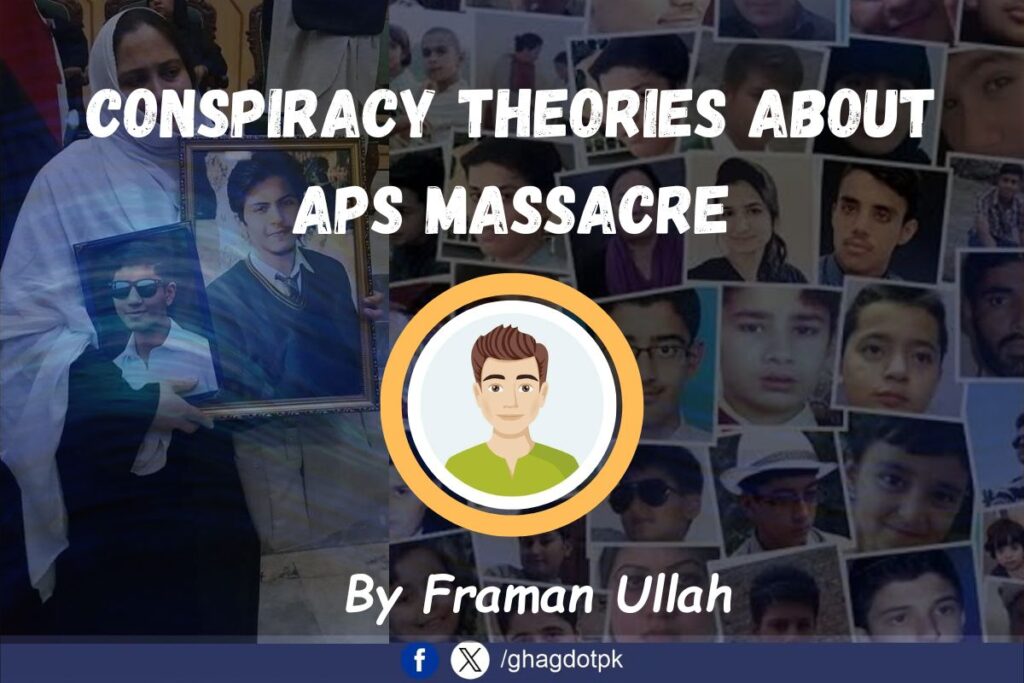By Farman Ullah
The Army Public School (APS) massacre on December 16, 2014, remains one of the darkest moments in Pakistan’s history. In this brutal attack, the Principal, staff members and 144 children were brutally Martyred. Carried out by the Tehrik-i-Taliban Pakistan (TTP), the tragedy not only devastated the nation but also drew the world’s attention to Pakistan’s fight against terrorism. However, in the aftermath, a series of conspiracy theories emerged, questioning the true nature of the attack and the involvement of various political and state institutions.
One prominent theory suggests that certain elements within the state were either complicit or negligent, allowing the attack to take place. Despite a thorough investigation by an independent inquiry commission, which identified security lapses but cleared the military of involvement, some political factions, notably the Pakistan Tehreek-e-Insaf (PTI), raised questions about the role of state institutions. These claims, often amplified by media outlets, created confusion and division within the public.
In a politically charged environment, where PTI was leading protests against the federal government, accusations surfaced suggesting that the TTP’s attack might have been orchestrated by foreign powers or domestic rivals. PTI, which governed Khyber Pakhtunkhwa at the time, accused the federal government of failing to ensure adequate security, further fueling the conspiracy theories. This created a distorted narrative, shifting the focus away from the actual perpetrators, the TTP.
Another troubling aspect of the conspiracy theories revolves around PTI’s leadership and its stance on terrorism. Imran Khan, then leading protests in Islamabad, was criticized for neglecting security matters in Khyber Pakhtunkhwa. Moreover, PTI’s later actions, including negotiating with and facilitating the return of TTP militants from Afghanistan, raised suspicions about their role in supporting the very group responsible for the APS massacre. The party’s softening stance on the TTP, coupled with controversial releases of imprisoned militants, further fueled the narrative that PTI was indirectly aiding the terrorists.
Despite these conspiracy theories, the reality is simple: the APS massacre was carried out by a terrorist organization with no regard for human life. The investigation and subsequent military actions demonstrated the commitment to bringing the perpetrators to justice. However, the political exploitation of the tragedy has complicated the national response to terrorism. The manipulation of the APS tragedy for political gain only deepens the wounds of the survivors and the families of the martyrs.
In the years following the attack, Pakistan’s efforts to combat terrorism saw mixed results. Operation Zarb-e-Azb, launched after the APS attack, led to significant gains, including the elimination of thousands of terrorists and the arrest of many more. However, the conspiracy-driven politics of the PTI, particularly its controversial ties with the TTP, has continued to destabilize the situation in Khyber Pakhtunkhwa, where terrorism remains a constant threat.
The rise in terrorist incidents, especially in Khyber Pakhtunkhwa, where the PTI is still influential, reflects the continuing challenge of eliminating terrorism. Reports in 2024 reveal a disturbing increase in attacks, most of them targeting security forces. The PTI’s support for peace negotiations with TTP, coupled with its political propaganda, has further complicated the fight against terrorism.
To ensure lasting peace and justice for the APS victims, Pakistan must address the ongoing political manipulation surrounding terrorism. The country must focus on the real enemies – the terrorist organizations – rather than allowing political divisions to cloud its national security strategy. Only by rejecting conspiracy theories and focusing on unity and security can Pakistan hope to prevent further tragedies and heal the wounds left by the APS massacre.






